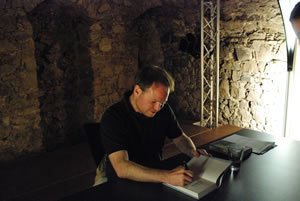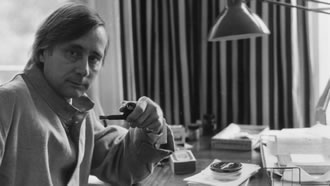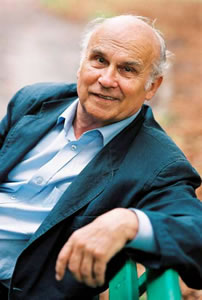De Duitse schrijver Kristof Magnusson werd geboren op 4 maart 1976 in Hamburg. Zie ook mijn blog van 4 maart 2007 en ook mijn blog van 4 maart 2008 en ook mijn blog van 4 maart 2009 en ook mijn blog van 4 maart 2010.
Uit: Summer of Love (Vertaald door Mike Mitchell)
“Outside my window a lemon tree is steaming in the rising heat. Eyes closed, I feel all over the large mattress, although I know there’s no one else there. I’m lying in bed in a hotel room in California reading about Australia in a guidebook. The trip round the world was the idea of the head of personnel who appointed me. For the first three months, he said, my position was free, after all the stress of the examinations I could take time out to live a little, to see something of life. The next day I paid three thousand marks for an air ticket with the words ‘Hamburg — London — New York — San Francisco — Hong Kong — Bombay — Hamburg’ printed on it in slightly smudged red ink. I’d already ticked off London, New York and San Francisco, I hadn’t seen anything of life there. To me the red double-decker buses, yellow taxis and cable cars looked like poor, dirty copies of the double-deckers, taxis and cable cars I knew from films. In each place I stayed one night and flew on, only in San Francisco did I stay two nights, because I had a hotel room with cable TV. I began to get accustomed to things, bought a second deodorant, a rather sweet-smelling one by Jean Paul Gaultier, which I used for my left armpit. For the right one I continued to use the Hugo by Boss which I’d bought for my job interview. It was fun being able to distinguish left and right, port and starboard, the two halves of this body that was to carry me through the world, by smell. On the fifth day of my trip round the world I hired a bicycle and rode across the red bridge and out of the city. Soon I had no idea where I was any more. I was riding through pinewoods along a country road with no markings and which wasn’t on my map. Coming round a curve, a village suddenly leapt out at me. It was simply there; without there having been any signposts or a board with the name, there were wooden houses in front of me with blue scraps of sea hung between them. I rode past a filling station with Save the Rainforest banners hanging out of the windows. Shortly after that I stopped and asked a man, who was sitting in the sun outside a house with paintings on the walls, where I could buy something to drink. The man had long grey hair and his beard was spattered with flecks of colour. He asked me how I liked his wall painting and pointed over his shoulder: animals, naked people and pink clouds, with flowers in all the colours of the rainbow twined round them. Above it was written: 30 Years Summer of Love 1967-1997.”

Kristof Magnusson (Hamburg, 4 maart 1976)


